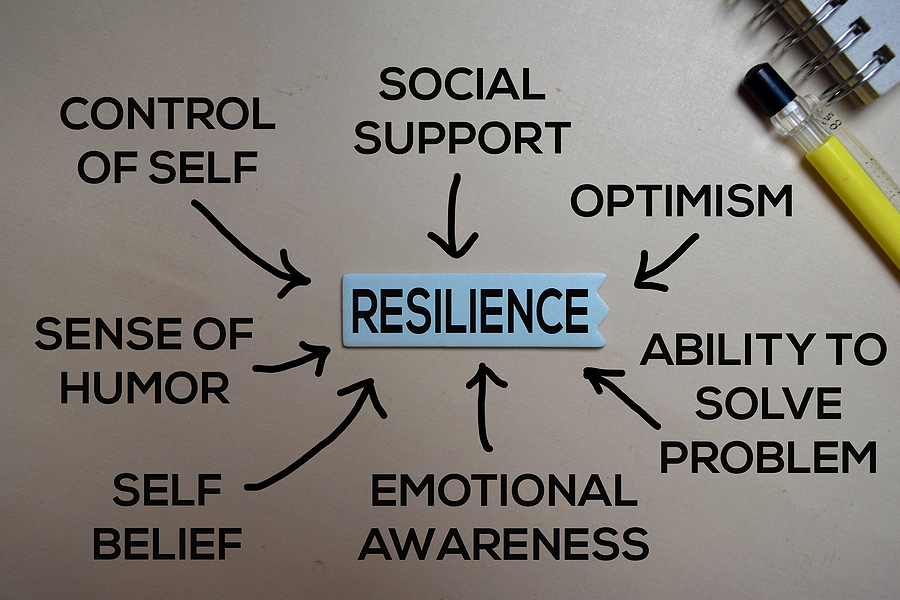 We’re capable of bouncing back from a crisis a lot faster than we might think. A new study being published in the Journal of Applied Psychology found that psychological recovery can happen even when people are still in the midst of a stressful experience. Those high in neuroticism may recover at an even faster rate because they’re better equipped to navigate stress.
We’re capable of bouncing back from a crisis a lot faster than we might think. A new study being published in the Journal of Applied Psychology found that psychological recovery can happen even when people are still in the midst of a stressful experience. Those high in neuroticism may recover at an even faster rate because they’re better equipped to navigate stress.
Ned Presnall, LCSW, owner of Plan Your Recovery, found people’s peak sense of powerlessness occurred at the beginning of the COVID-19 crisis. As people reacted to the challenges and understood the potential impact, their overall sense of helplessness decreased. Prenall attributes the decreased helplessness to the decision to take action. He said, “Once you start to engage in decision-making, it’s very stressful, but you also experience an increase in self-efficacy. A decrease in powerlessness and an increase in authenticity are probably good proxies for self-efficacy. But decreased powerlessness and increased authenticity aren’t a comprehensive measure of wellness and aren’t a great proxy for normalcy, where you have a sense of self-efficacy and a low-level of nervousness and anxiety.”
Psychotherapist Alex Ribbentrop, LCSW-QS, CFTP questions the ability for those with high neuroticism to recover quickly because they are susceptible to issues that present as effectively managing stress. He explains, “they may compartmentalize or suppress emotions more than those with other personality types and traits. This may result in better coping short-term, but it could negatively impact people or manifest in problems with other areas of functioning (i.e. seeking control via efforts at work, in relationships, etc.)."
Whether or not someone considers himself neurotic, much of bouncing back is based on how well an individual adapts to changes. Amy McWaters, CEO at The Hamper Emporium, noticed the idea of "a new normal" set in fast for her. team “It felt stressful and the element of the unknown was exhausting,” said McWaters, “but now we have accepted that the new normal means being adaptable and expecting the unexpected. This keeps us open to the reality that change is inevitable and happens fast during the pandemic. We can't cling to anything as being stable outside of our adaptability.“
Since the end date of COVID-19 is unknown and people will have personal crises in the future, how can people build their resiliency? Scot J Chrisman, founder and CEO at The Media House believes that how we think determines how easily we bounce back. Chrisman says, “The first thing that we should do is not let ourselves succumb to negative thoughts and be defeated by the situation.”
James Pearson, CEO of eVenturing, agrees with Chrisman. “Bouncing back depends on the person's way of thinking,” said Pearson. "I was able to shift my perspective and mindset as soon as I felt the need to do it. Instead of dwelling on fear and anxiety, I shifted my thoughts on how to innovate my business. How should my business adapt? How can I help my customers cope up with the pandemic? How should I manage the risk among my employees? Negativity can drive you to adapt. However, your sincerity to help and instinctive resilience is a driving force for you to bounce back as well.”
Dr. Patricia Celan, postgraduate psychiatry resident, said “Shift your focus from what you cannot control to what you can control." And this sense of control can be around the small things. Chrisman advises,“Change your routine, one step at a time, and keep your connection with optimistic people, even virtually. Breathe some fresh air even just inches from your door and remember that this too shall pass.”
Presnall added, “Problem-solving and rest are also key. Engaging in creative problem solving improves our sense of wellness since we’re using our resources to meet the challenge. When we’re paralyzed by what to do, we’re more likely to continue to feel helpless. But in a crisis that’s as protracted as COVID-19, you can’t stay in that problem-solving mode all the time. You have to find ways to continue to engage in hobbies and socialization and other things that bring you relief.”
A crisis may even bring out your creative side. Austin Iuliano, a social media consultant, said a key to resiliency for him was creating new patterns to create a new normalcy. He explained, “I created a side project to give myself little wins. I started an entire e-commerce business around unicorns called This Unicorn Life. Side projects are a must for any business professional during a recession as it allows you to build a ton of confidence and create success outside of the job-hunting market.” And who doesn’t love unicorns?
Tina Arnoldi, MA is a marketing consultant and freelance writer in Charleston SC. Learn more about her and connect at TinaArnoldi.com